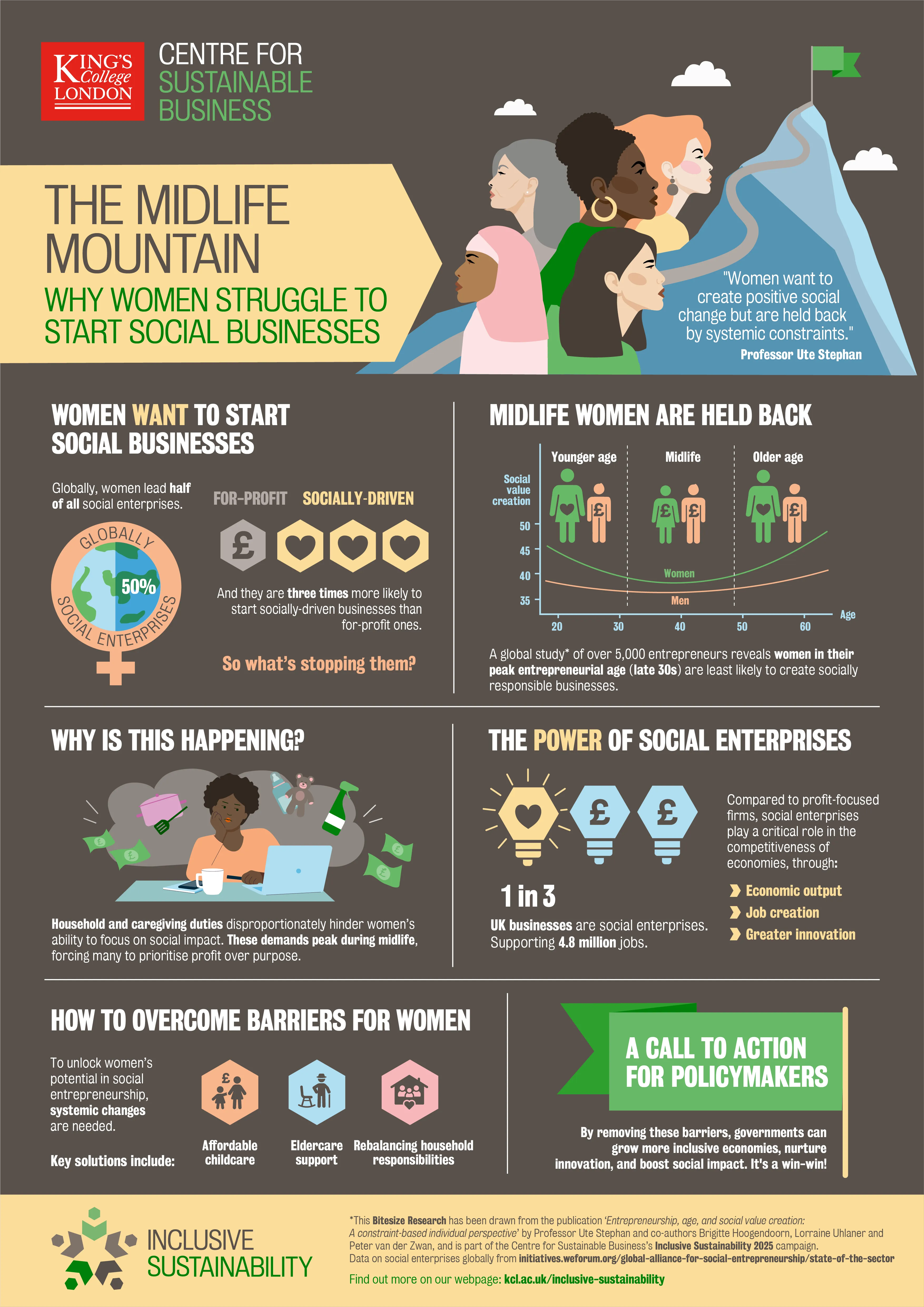05 February 2025
Driving inclusive sustainability: In conversation with Professor Ute Stephan
Rosie Clemo, Communications and Engagement Officer
In this interview, Professor Ute Stephan talks about her research on the barriers women face when starting social businesses, and how we can change it.

At the Centre for Sustainable Business (CSB), we believe sustainability and inclusivity go hand in hand.
Through our Inclusive Sustainability 2025 campaign, we aim to spotlight groundbreaking research and actionable insights that promote diversity and inclusion in sustainable practices.
As part of this campaign, we interviewed Professor Ute Stephan about her latest research on how midlife women are held back in their journey to social entrepreneurship.
Ute is a Professor of Entrepreneurship at King’s Business School and CSB Affiliate. With decades of research behind her, Ute is an expert on the psychology of entrepreneurship and holds multiple accolades to her work – most recently, the 2024 JIBS Decade Award for her lead-authored paper on institutions and social entrepreneurship.
Thanks for joining us, Ute! Let’s talk about your latest published research: ‘Entrepreneurship, age, and social value creation: A constraint-based individual perspective’. What does it explore?
This research, co-authored with Brigitte Hoogendoorn, Lorraine Uhlaner, and Peter van der Zwan, explores how systemic barriers hold back midlife women during their peak entrepreneurial years.
While social entrepreneurship is often viewed as inclusive, the reality is mixed. For instance, past research shows social entrepreneurship can be empowering and serve as a gateway for women into both social and commercial entrepreneurship.
However, women leaders in social enterprises also face significant pay gaps compared to men, and indicates that entrepreneurs closest to social problems face the greatest barriers in running social enterprises. These findings suggested that there may be important barriers based on gender, but also ethnicity, and socioeconomic status.
What were the key findings?
Our study, encompassing over 5,000 entrepreneurs from 44 countries, uncovered a surprising trend: women are least likely to found social enterprises in midlife (end of their 30s and beginning of their 40s). This periodis a critical time for entrepreneurial activity. This is when constraints in their life force them to opt for profit rather than purpose.
What’s stopping these women from creating social start-ups?
Unfortunately, the ‘midlife era’ often coincides with the peak of caregiving responsibilities, whether it’s raising children, managing households, or caring for aging family members.
These competing demands leave women with limited time and resources to pursue ventures that prioritize social impact. As a result, many feel compelled to prioritize profit-driven goals over their aspirations to create meaningful social change.
Sounds like a big gender gap in social enterprises…
It is. But women have a clear inclination toward social entrepreneurship. They lead half of all social enterprises and are three times more likely to start socially driven businesses than traditional ones. Social enterprises focus not only on economic gains but also on creating social and environmental value. However, systemic inequalities continue to limit women’s ability to fully engage in this space.
Why do you think social enterprises are so important to more sustainable businesses?
Social enterprises are crucial drivers of sustainability and positive social change. Despite representing just 10 million global businesses, they support 200 million jobs and play an integral role in addressing societal challenges.
Moreover, social enterprises outperform profit-maximizing businesses in terms of innovation too. Its these enterprises’ integration of economic, social, and environmental goals that makes them vital players for sustainability and inclusivity.
What can we do about it?
To empower women entrepreneurs, systemic barriers must be addressed. Affordable childcare, accessible eldercare, and a more equitable division of household responsibilities are critical solutions. In this sense good social policy toward gender inclusion is good economic policy as it removes barriers for women to start social business.
Governments, businesses, and communities could work together to create an environment where women are free to pursue socially focused entrepreneurship without compromising their personal or professional lives.
Why do you feel so strongly about this research?
Entrepreneurship has the potential to be a very fulfilling career while creating societal and economic value. Yet it can only deliver for the individual and society if people can pursue the type of entrepreneurship they deem meaningful. For many women this is social entrepreneurship, and they should be free to choose it.
What do you hope this kind of research can do?
I hope it reminds us that social policies promoting gender inclusion directly impact entrepreneurial activity and its broader societal benefits. I also hope it encourages policy makers, support organisations, and educators to reframe entrepreneurship beyond profit maximization to emphasize its role in achieving social and environmental impact, because by doing so we can attract people into entrepreneurship who would not normally view themselves as entrepreneurs.
Thanks for joining us Ute!
Thanks so much for having me, Rosie!

Download this infographic, 'Midlife Mountain', based on Ute’s research.
Find out more about our Inclusive Sustainability campaign here.
This article was brought to you by the Centre for Sustainable Business. Find out more about their work here.

